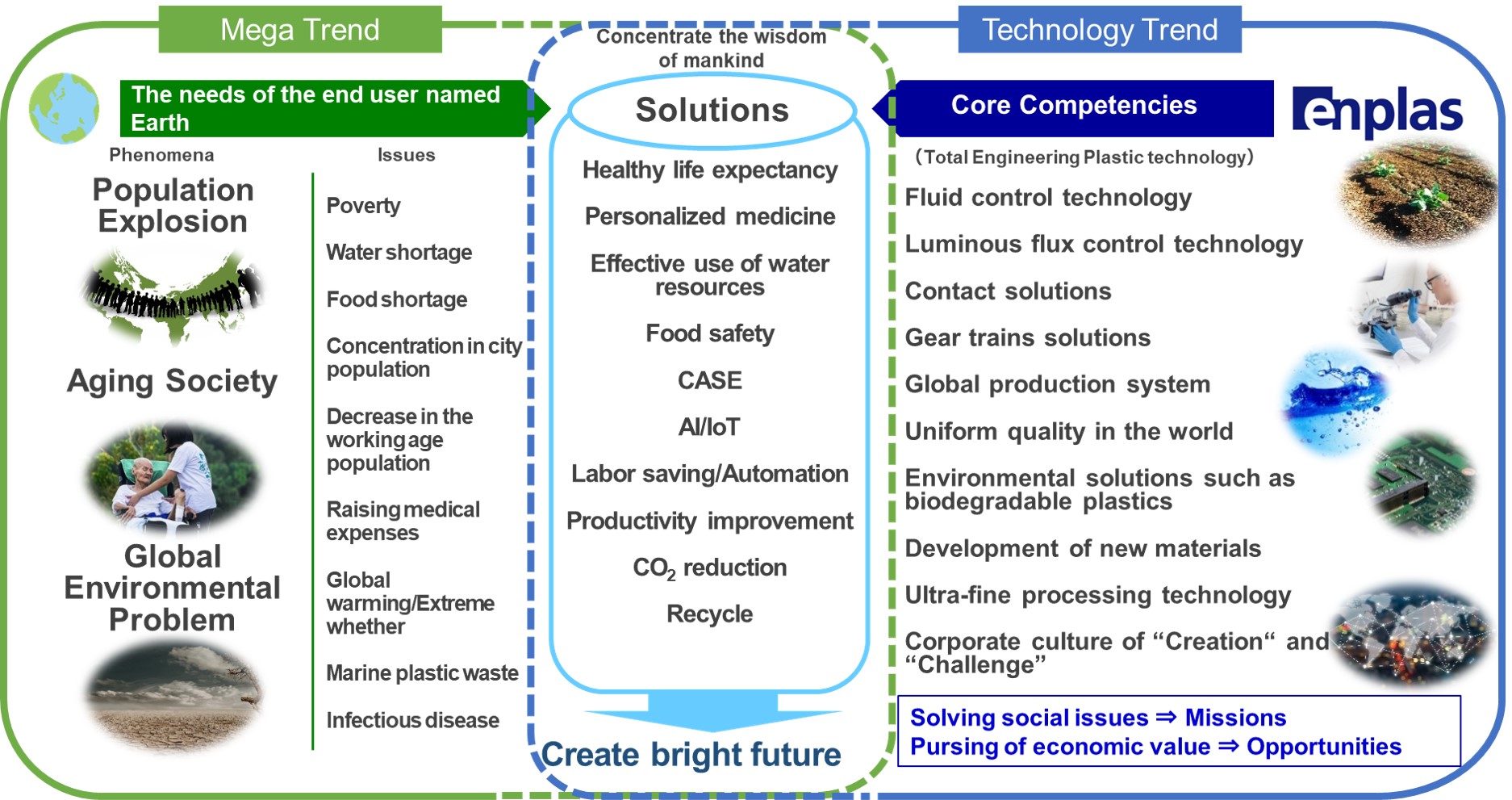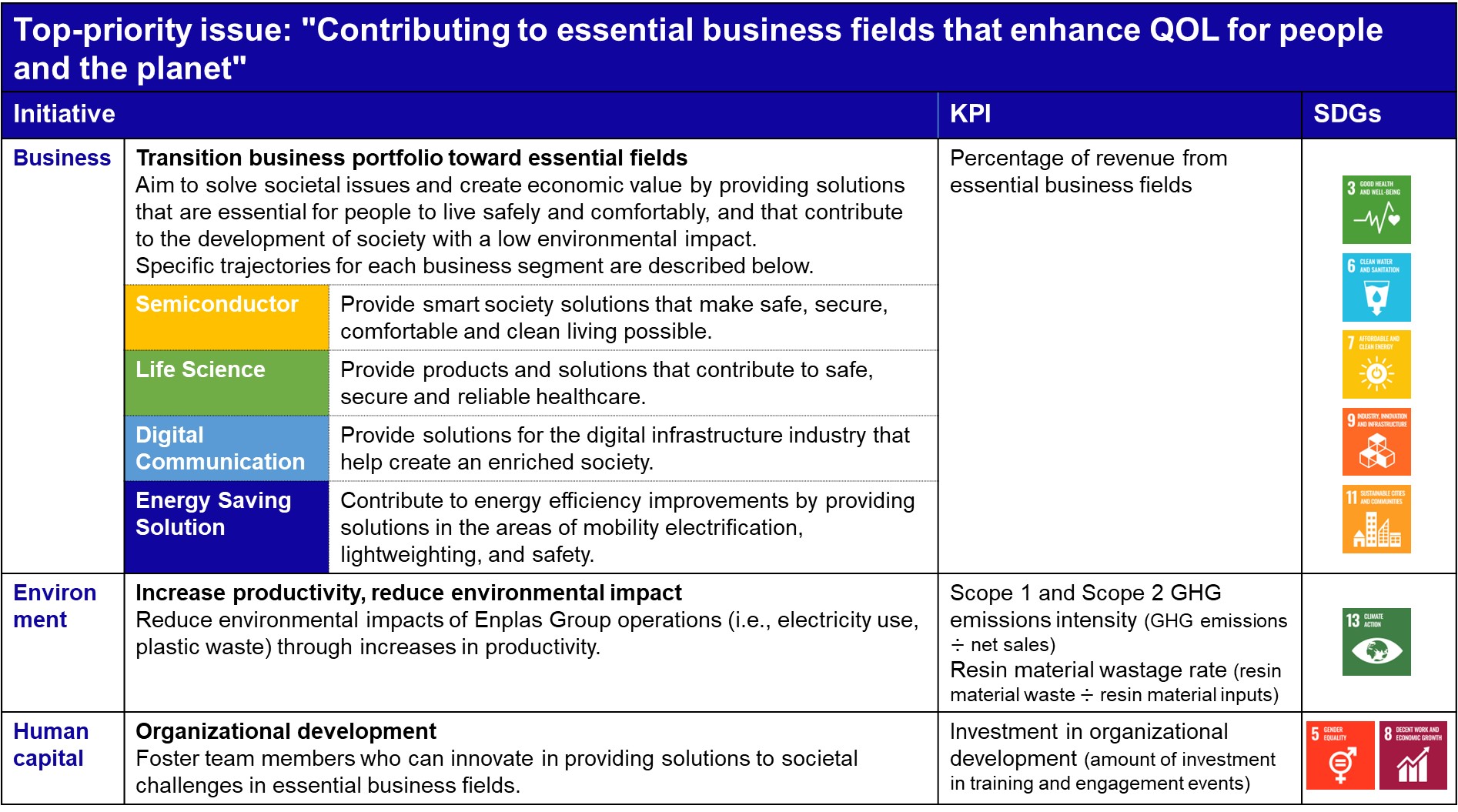Sustainability at Enplas
Overview
Since our founding, Enplas Corporation has worked with customers around the world to contribute to develop a prosperous society by advancing the development of materials, process engineering, and evaluation technology, and by creating and mass-producing products previously thought impossible. Our Corporate Philosophy represents our business policies, spirit, and ethics of the Enplas Group, articulates our corporate mission to contribute to societal development, and lays out basic principles for corporate governance of the Enplas Group. By providing high value-added products and services that meet the needs of markets worldwide, we have become a global enterprise with operations in 14 countries and regions, with markets outside Japan accounting for 80% of consolidated sales.
Businesses today face rising stakeholder expectations on information disclosure and business continuity measures, such as environmental, social and governance (ESG) initiatives and actions on the Sustainable Development Goals (SDGs). The Enplas Group, under the president’s leadership, has formulated a long-term vision connecting our core competencies to social issues, and is communicating with employees about the Group’s ESG initiatives. We are also advancing a project to enhance the overall performance of the Enplas Group in areas ranging from human capital development to the SDGs to next-generation factories.
Corporate Philosophy (formulated 2023)
Our Goals (connecting social issues with our core competencies)
Medium- to long-term vision (business portfolio)
We are always pursuing something new and the success of our business depends on this. We’re planting seeds for future business through sustained research and development carried out within the trusting relationships we have built with customers and other institutions.
As for our business portfolio, we focus on fields of business we define as essential* due to their role in supporting healthier, more secure ways of living.
We consider our Semiconductor and Life Science segments as essential businesses that are also enjoying market growth. We direct profits from our Digital Communication and Energy Saving Solution segments toward essential business fields and also shift these segments toward focusing on more essential areas. By transitioning our business portfolio in this way, we aim to achieve sustainable growth without major disruption to our business.
*Essential: Business fields that enhance quality of life (QOL) for people and the planet.
Defining our material issues
Materiality assessment process
We have identified the issues that the Enplas Group needs to address, and established targets for each of them as well as metrics for measuring progress.
Step 1: Create list of relevant societal issues
We created a list of relevant issues that reflect megatrends related to the environment and society, technology trends, and sustainability frameworks such as the Sustainable Development Goals (SDGs).
| Environment | Global warming Water scarcity Ocean plastic pollution |
| Society | Population explosion and societal aging Data society Inequality Trade protectionism |
| Regulatory | Carbon tax Stronger regulations on (gasoline-powered) automobiles Stronger regulations protecting personal information and human rights Increased export restrictions driven by protectionism |
Step 2: Map issues and identify material issues
From the list of societal issues selected, we identified the most material issues following careful discussion within our Sustainability Committee and in consideration of our Corporate Philosophy, medium-term strategy, and other factors.
Step 3: Approve material issues
The Sustainability Committee reported its decisions to the Board of Directors, which then approved them.
Plans for action on material issues
The Enplas Group has designated “contributing to essential business fields that enhance QOL for people and the planet” as our highest-priority issue. We have committed to undertaking the following initiatives to address this issue.

Climate Initiatives (reporting based on the TCFD recommendations)
Metrics and targets
Metrics and targets for assessing risks and opportunities
As indices for measuring progress toward the Group’s top-priority issue (material issue): “contributing to essential business fields that enhance QOL for people and the planet,” we have set the “percentage of revenue from essential business fields,” “GHG emissions intensity,” “resin material wastage rate,” and “investment in improving organizational capabilities” as well as their mid-term numerical targets, and will monitor progress toward these targets on an annual basis.
| KPI | FY2021 results | FY2022 results | FY2023 results | Target for FY2025 |
|---|---|---|---|---|
| Percentage of revenue from essential business fields | 60% | 69% | 63% | 75% |
| GHG emissions intensity: Scope 1 and 2 GHG emissions ÷ net sales (ton/millions of yen) | Intensity: 0.6 metric tons | Intensity: 0.5 metric tons | Intensity: 0.5 metric tons | Intensity: 0.5 metric tons |
| Resin material wastage rate: resin material waste ÷ resin material input | 4.7% | 3.6% | 6.0% | 4.0% |
| Investment in improving organizational capabilities: amount of investment in training/events to improve engagement *Includes labor costs associated with participation in training |
34,000 yen/year per employee | 61,000 yen/year per employee | 176,000 yen/year per employee | 100,000 yen/year per employee |
Defining and engaging stakeholders
The Enplas Corporate Governance Policy defines our stakeholders as shareholders, etc.; employees; customers; suppliers; and society. The Enplas Group is a dedicated manufacturer with key operations in manufacturing, processing, and sales of various products made from engineering plastics and their composites. For this reason, we are especially focused on building sustainable relationships with customers, suppliers, and employees.
Shareholder engagement
The General Meeting of Shareholders is our highest decision-making body. We strive to support shareholders in exercising their rights, such as by providing ample time for proxy voting.
We carry out Investor Relations activities to ensure that our shareholders understand the state of our business and our approach to management. For institutional investors, we hold an earnings announcement every quarter.
We practice fair disclosure by actively disclosing IR and other information on our website and elsewhere. Disclosure documents that we deem important, such as summarized financial statements, business reports, shareholder meeting notices, and earnings announcement materials, we also make available as an English translation on our website.
Customer engagement
We view customer engagement not only as meeting customers’ needs but also as taking proactive steps to solve the problems they face and proposing solutions to improve the functionality of their products.
Supplier engagement
Suppliers of the Enplas Group consist primarily of manufacturers of engineering plastic materials and partner companies to whom we outsource injection molding of parts. Because many of these partner companies are small and medium-sized enterprises, and also for our own business continuity, it is important that we create win-win relationships with them. This is why, for example, we include next-month cash payment as part of our payment terms.
Employee engagement
In 1964, the company president began holding monthly birthday parties to connect with individual employees and express appreciation for them in their birthday month. Anniversary parties, held every year with company-wide participation, including company presidents and officers, at locations ranging from Singapore (where we set up operations in 1975) to the US and UK, to Southeast Asia and China, help unite the Group on a global level.
Identifying risks and opportunities
The Enplas Group is a manufacturer of high-precision, high-performance parts. This makes our business sensitive to changes in product markets, and poses a challenge to setting fixed medium- to long-term business plans. We believe that anticipating changes in the product market and responding to these changes in a timely manner is of primary importance, and for this reason we do not disclose medium-term business plans. For this reason, we do not disclose medium-term business plans. For more information about our climate-related risks and opportunities, please see the “Climate Initiatives (reporting based on the TCFD recommendations)” page. As ocean plastic waste draws increasing attention, we are working to reduce our own levels of engineering plastic waste and exploring ways to adopt bioplastics.
- Sustainability
- Sustainability at Enplas
- TCFD
- Environment
- Environmental Policy
- Environment
- Social
- R&D
- Compliance
- Human Capital
- Supply Chain
